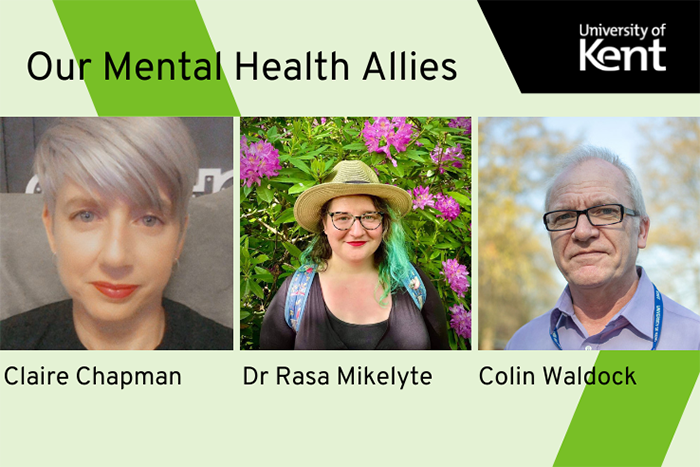In aid of World Mental Health Day, we caught up with three of our Mental Health Allies to find out a bit more about them and why they decided to take up the role.
Tell us a bit about what you do as a Mental Health Ally
Rasa: It’s hard to say if people who have spoken to me to about mental health have done so because I am listed as an ally, or because they already knew me – but I hope being an ally helped! It has been great to be part of the ally network at Kent, too. I have learnt about mental health support available to staff and students, and sometimes – even if in very small ways – help shape it.
Colin: I have participated in impromptu meets with colleagues allowing for offloading of issues and concerns. I approach this role in a relaxed and informal way. Where necessary, I would signpost colleagues to the available resources.
Claire: I support the creation and promotion of Mental Health awareness training and resources across the organisation, trying to remove the stigma associated with mental health and provide ways where employees can recognise when they need support and where they can find it
What can someone expect when they reach out to you?
Rasa: Time, attention and genuine interest. I may not always find the words that can help, but I will listen and I will care.
Colin: Someone who will allow them to tell their story, or just have a chat over a tea or coffee if that is what is needed. Someone who will not seek to cure them but will listen and engage with them in a meaningful and real way.
Claire: Someone who will listen, give you time and help you find the support you need.
What do you love about being a Mental Health Ally?
Rasa: I love a chance to talk to people about mental health – including being open about my own. The ally role has meant I have more chances to bring up and normalise not feeling mentally well or needing support. From kitchen conversations to staff meetings, being part of the allies feels like a ‘license’ of sorts to talk about mental health more.
Colin: I do this because having suffered from a severe bout of mental illness previously, I have some insight into the issues and a perspective on what it feels like to encounter mental health challenges. I bring to the role these factors to improve the experience of others.
Claire: That by taking even a small amount of time you can make someone else’s day better.
What are the qualities you think make you a good Mental Health Ally?
Rasa: I’m not sure I’m the best person to answer this! I hope that both living with recurrent depression and having worked in mental health services in the past has given me an ability to have sensitive conversations about feeling unwell or distressed.
Colin: Patience, an ability to listen, and perhaps most importantly an ability to walk alongside someone else and offer them time.
Claire: Someone who is empathic, a good listener and cares for others.
What is one way you de-stress and relax?
Rasa: Bake! Then test out my baking on colleagues! The frozen pea cake got eaten surprisingly quickly!
Colin: I have to say I struggle with this still. I have an exercise bike in my study at home that I use to de-stress, I also still take medication to help keep my mood stable. As an autistic person, I have used mindfulness approaches over the years to maintain a status quo.
Claire: I like to go out into my garden and potter around, take cuttings of plants and grow things, or walk with just one of my 5 dogs!
With one in four of us experiencing a mental health problem each year, our Mental Health Allies are here when it’s hard to find the right words to start a conversation. If you are struggling, they will listen without judgement and can signpost you to available support and resources.
If you’d like to reach out to one of our Mental Health Allies, you can contact them via email or Teams. Find out who our allies are and get more information about the role.
